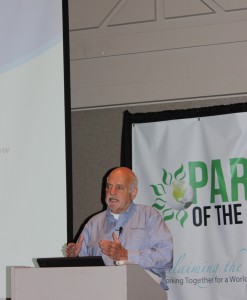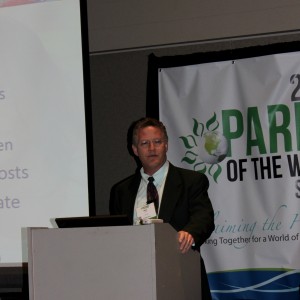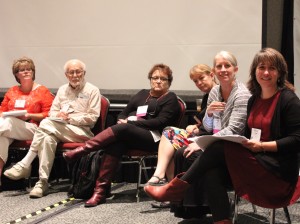
Global humanitarian work and local mischief making can make the world a more peaceful, intermingled place. A shared lecture on Saturday’s during The Parliament of the World’s Religions explored the power in doing good.
Retired BYU professor Warner Woodworth cited LDS prophets’ teachings on generosity and helping others. Joseph Smith, Woodworth said, taught that members of The Church of Jesus Christ of Latter-day Saints is to serve the whole human race. The law of consecration was once faithfully practiced in the church. President Gordon B. Hinckley declared “we believe in humanitarianism” and that poverty is the greatest pandemic in the world today.
According to the Book of Mormon, “When you are in the service of your fellow beings, you are only in the service of your God.” Belonging to a church that believes so strongly in humanitarian efforts, LDS members do service projects, serve volunteer missions and pay one-tenth of their income to the church as a way to show love for God. And yet, Woodworth said, many still wonder what more they can do.
Many LDS members have initiated grassroots humanitarian projects throughout the world. Woodworth himself is an experienced humanitarian and has launched many NGOs, including H.E.L.P International. With the 2010 earthquake in Haiti, he and his BYU class successfully formed Sustain Haiti.
The LDS Church’s humanitarian giving has totaled nearly $1.5 billion in recent decades. However, Woodworth said, the church can’t always get deeply involved in places or situations due to legal issues or risks. Individual members are often able to step up and provide service the church, as an institution, can’t. “Volunteers say, ‘I want to figure out how to use my religion as a Mormon in bettering society and especially in helping with a crisis,'” Woodworth said.

Colleague Alan K. Jones then discussed the Liahona Children’s Foundation. Jones is the executive director of the foundation, which aims to eliminate malnutrition and provide educational opportunities to LDS children around the world.
At least 150 million children around the world are underweight or stunted in growth, and 80 percent of brain development occurs by age three, Jones said. As a human family, people have the responsibility to support those around the world. With such a large number of children who are malnourished, the foundation needed a way to make its efforts more manageable. To do this, the foundation focuses on LDS children, but will not deny assistance to any child.
“About one third of the kids we feed are actually not members of our church,” Jones said. “And we’re totally fine with that. There’s no reason it needs to be a religious affiliation or not.” Volunteers encourage children to bring their non-LDS friends, Jones said.
Support for the Liahona Children’s Foundation is appreciated in many forms. “Pray for us,” Jones said. “I have no doubt that prayers open doors and that prayers can have a very valuable impact.”
Michael Corbett, from Ogden, was inspired by Woodworth’s and Jones’ lectures. “I’ve always wanted to do something,” Corbett said. “Helping people through humanitarian work was one of those things always in the back of my mind. I thought, ‘Once I have money, then I can do it.'”
Corbett works with RedCastle Media, a video production company that tells stories from people throughout the world. Corbett gets the opportunity to do humanitarian work because of his work filming. He plans to get more involved with humanitarian work in the future and spoke with Woodworth about opportunities to do so.
The next part of the lecture focused on “mischief making” in faith communities. Mischief making describes the act of inspiring others to make changes, and can be as complex as starting an NGO or as simple as smiling at a grumpy coworker. The discussion was informal and interactive, and attendees sat in a circle to better facilitate dialogue.

Teresa Posakony and Erin Gilmore led the discussion. They had the attendees find people they didn’t know and told them questions to discuss. These questions focused on people’s experiences at the Parliament and how people had done mischief making in their lives.
“I like getting into smaller groups where you can talk and get other people’s ideas,” said Parliament participant Jerilyn Holt. Everyone acknowledged the difference in the room’s energy level once the small groups were formed, allowing them to make friends and engage in interfaith dialogue.
Gilmore finished by reading a poem by Rumi: “I like when the music happens like this: Something in Her eyes grabs hold of a tambourine in me, Then I turn and lift a violin in someone else, and they turn, and this turning continues, It has reached you now. Isn’t that something?”
Mischief makers, who lift a violin in others and help them feel and hear the music, can make the world a better, more peaceful place, she said.




